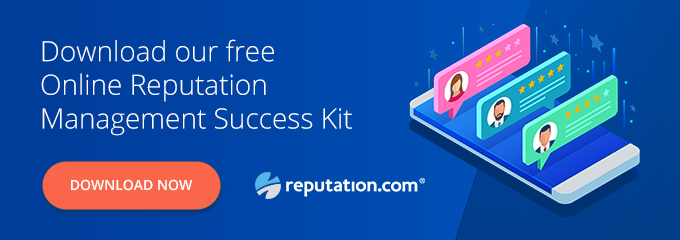Q&A with Andy Crestodina: Ethics, Influences and Analytics
Reputation Staff Writer
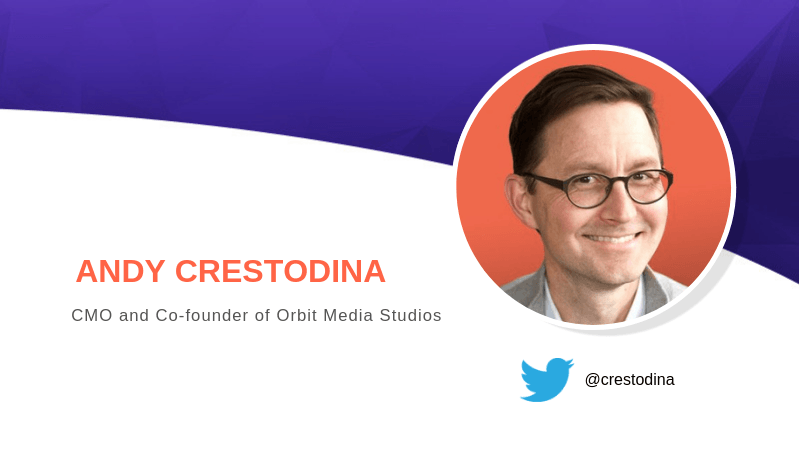
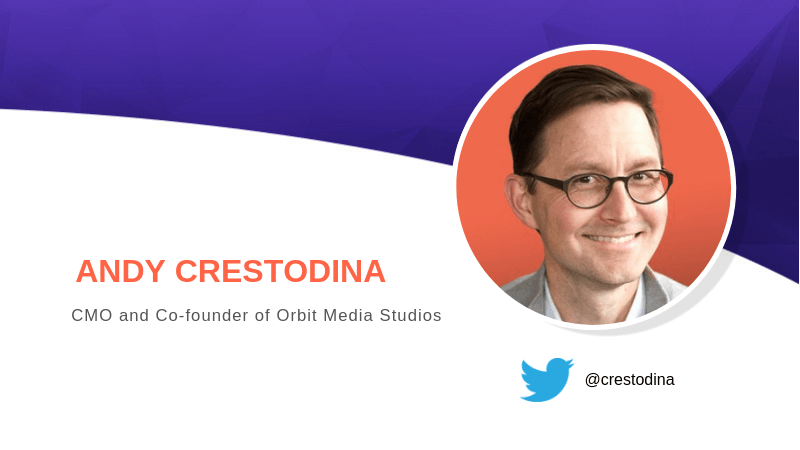
Andy Crestodina has provided digital marketing guidance to more than 1,000 clients in his 18 years in the business, and now serves as chief marketing officer and co-founder of Orbit Media Studios. He has written hundreds of blog posts full of strategic advice to marketers, and he hosts his own podcast. He has won numerous awards — Forbes named Crestodina one of its Top 10 Online Marketing Experts and Entrepreneur named him one of 10 Online Marketers to Follow for Inspiration and Growth.
In your bio on your site, you champion “ethical digital marketing.” What does that term mean to you, and how do you practice ethical digital marketing?
I don’t exactly have a code of conduct, but here are things that I believe in deeply:
- No spam: Never send mass emails to people who didn’t request information.
- No clickbait: Write articles that live up to the promise made in the headline.
- Don’t feed trolls: Contribute to positive social experiences.
- Be generous: Give value before expecting value from others.
Digital marketing has a shady reputation, especially SEO. I want my voice and my actions to contribute to the best side of our industry, of ourselves.
You’re an expert in influencer marketing. Besides the benefit of links, how can companies get influencer marketing and SEO to work together to increase traffic and conversions?
It’s true — some types of influencer marketing lead to links. Others create brand awareness only. Here’s a little overview of the types of collaborations and formats with the likely outcomes for each:
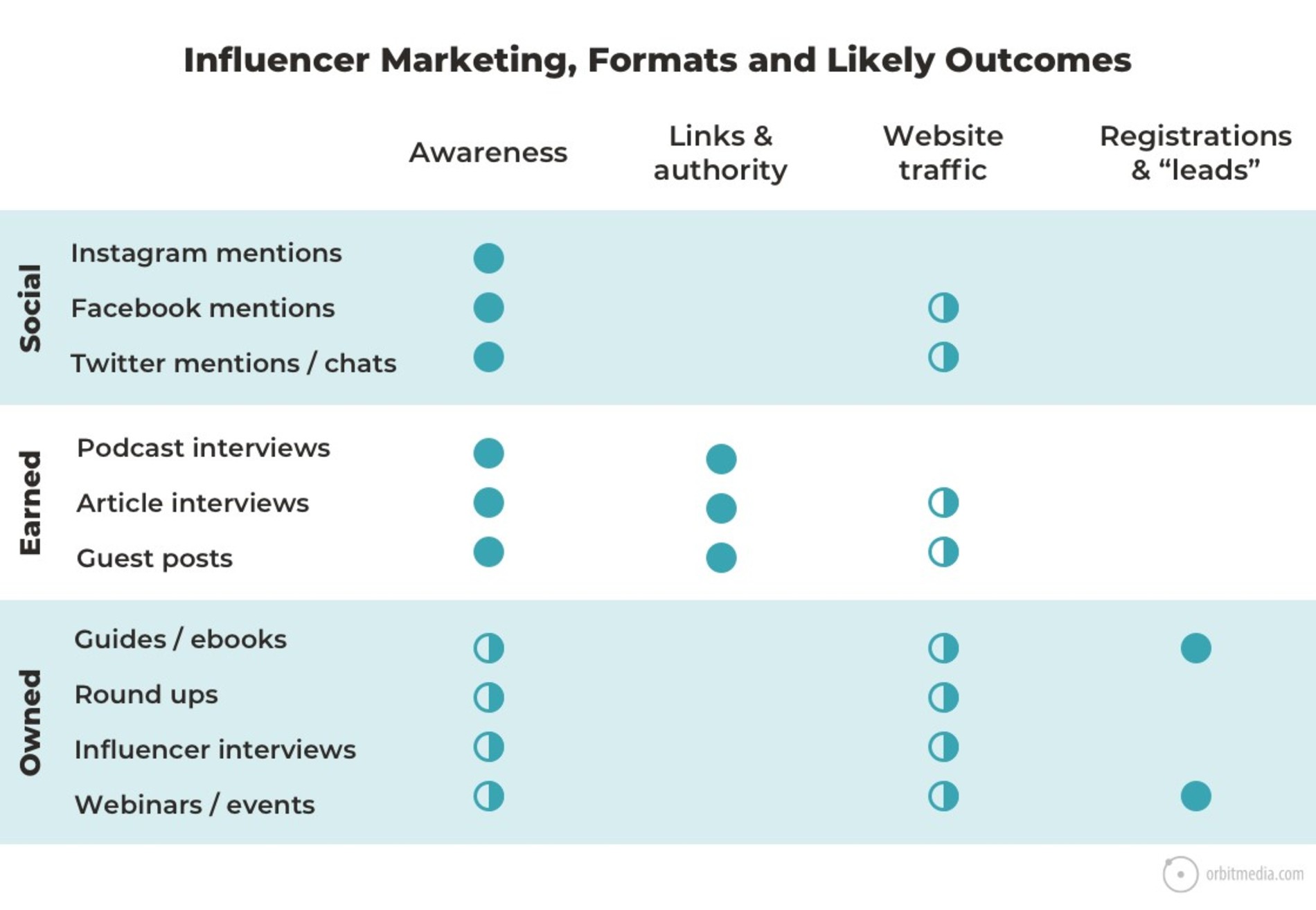
(Image Source: How to Find Influencers, Orbit Media)
You can see that a lot of what people try to do with influencers is just about social media. They want Instagram and Facebook influencers to mention them. But the benefits from this are short-lived. And you’re not likely to see any traffic.
Brand awareness is important, especially in B2C, where you need a lot of visibility.
But for those more durable benefits (traffic and rankings), we need to focus on the content collaborations: Interviews and guest posts.
So how, specifically, does influencer marketing affect rankings?
Any mention and link to your site from another site has a search ranking benefit. It tells Google another site trusts your site. That makes every page on your site more likely to rank, including your product and service pages.
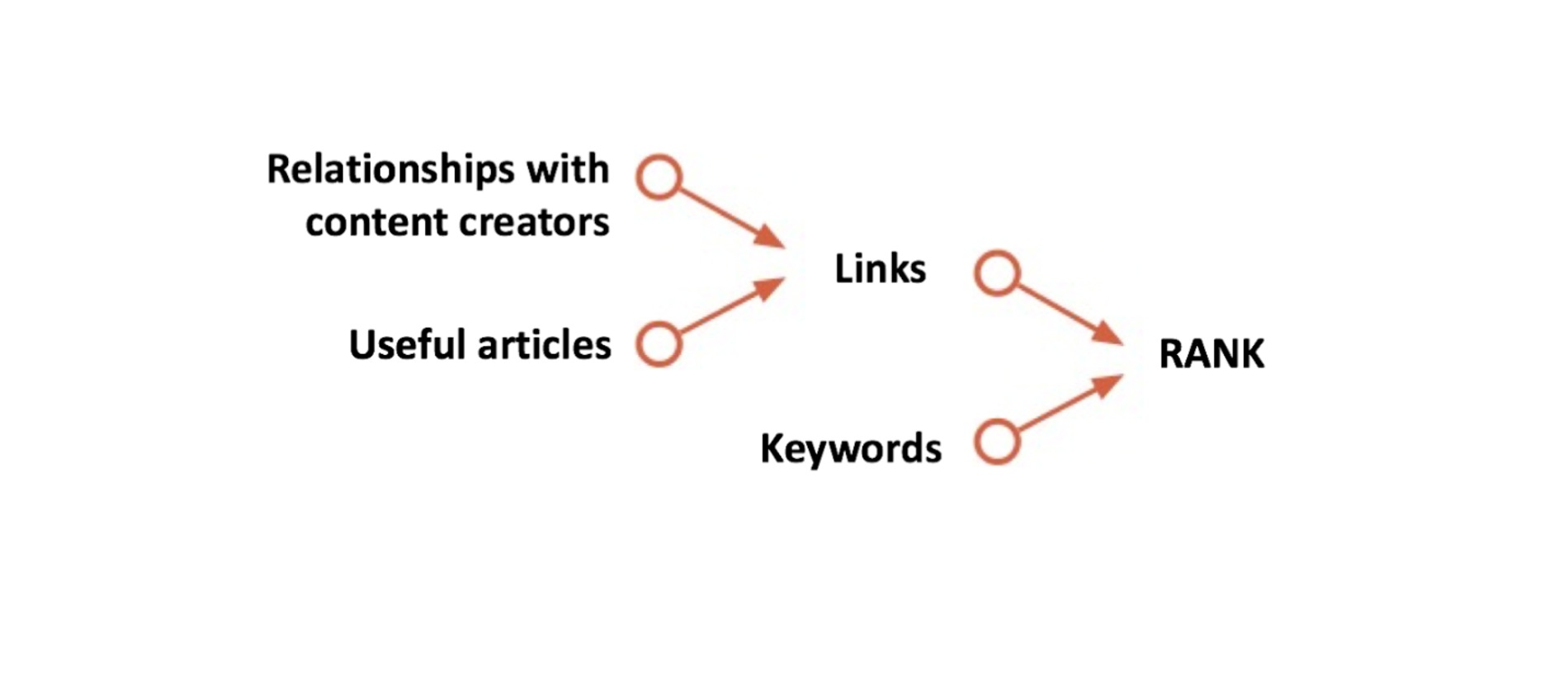
So some of the best benefits of influencer marketing are SEO, but only if you set aside the pay-for-Instagram-posts idea and focus on the collaborate-with-bloggers idea.
If you build relationships with bloggers and editors and create content together, eventually people will link back to you, which benefits the search rankings of pages on your domain.
These are the classic formats for collaborative content:
- Adding contributor quotes
- Writing roundups
- Pitching guest posts to our favorite sites
- Conducting interviews … like this one!
The indirect benefits to search rankings are real. But it’s also great for the quality of the content and for relationships. The best outcome of influencer marketing is friendship.
What would you suggest to companies that have contracted with an influencer and then found the relationship to be harmful? Like Jared Fogle for Subway?
Crisis management begins before the crisis. You need to have a plan in place in advance. Those super-high-level celebrity influencers can fall far and fast. And with ultra-high visibility come ultra-high risks.
Fortunately, the Fogles and the Cosbys are rare but little mistakes with big embarrassing results are not. A good example was from years ago when Oprah promoted the Microsoft Surface tablet … from her Apple iPad.

These kinds of things happen all the time. And when they do, the results are instant and expensive. Everyone loses trust.
You can avoid this by focusing on organic influencer marketing. Connect with your true product evangelists, rather than paying famous people to pretend that they like your brand.
Amplify the voices of anyone who says anything positive. And when you find a content creator who is talking about you (blogger, editor, columnist), look for ways to collaborate. Write something for them. Or include them as a contributor to something you’re writing.
Later, they may reciprocate and mention you in their content. That’s a press hit. It takes listening and networking, but it has no risk or cost.
Google Analytics is an indispensable tool for marketers. How can they use it to its full advantage? What’s important and what’s a time-waster?
Analytics is critical, but often useless. Here’s why:
Reporting doesn’t affect results. Action does. So unless the marketer is using Analytics to find insights (through analysis) and take action (change something in their marketing), then the ROI for GA is zero.
I know when someone is focused on reporting, not analysis, when they ask the questions below. And here’s how I often answer:
- How often should I look at Analytics? Anytime you have a question or you want to see if something is working.
- What reports should I look at in Analytics? Whichever reports answer the questions you’re asking or support or reject your hypothesis.
- Who at my company should be in charge of Analytics? Whoever needs information about website activity and is checking the results of a marketing effort or website change.
To really answer questions, you need to go deeper than the surface-level reports. That means using more of the tools — segments, advanced filters, secondary dimensions, drill-downs, etc.
Each of those tools is to the right of the main navigation. They’re in the reports themselves. To use them, you need to click to the right of the Analytics menu bar.
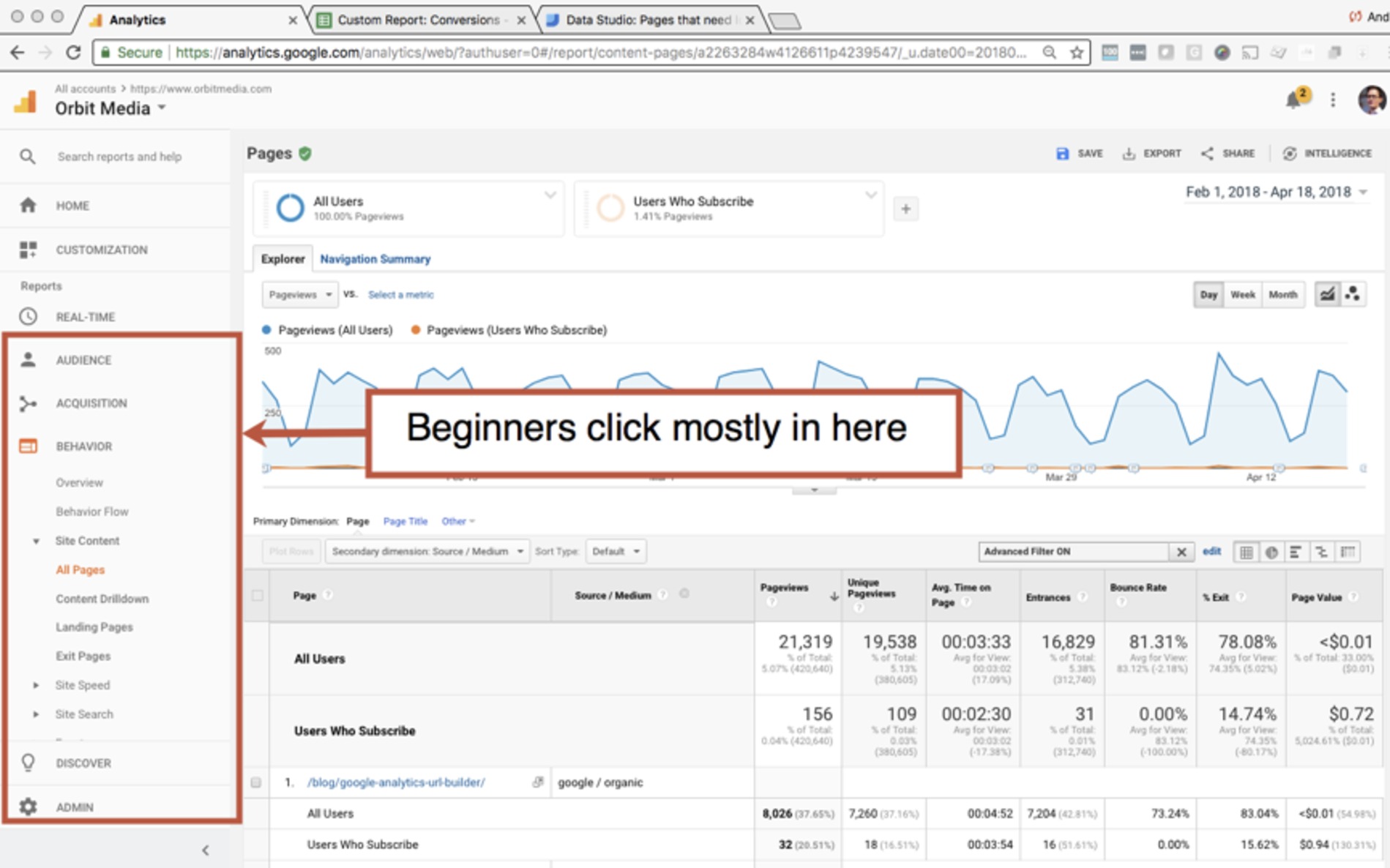
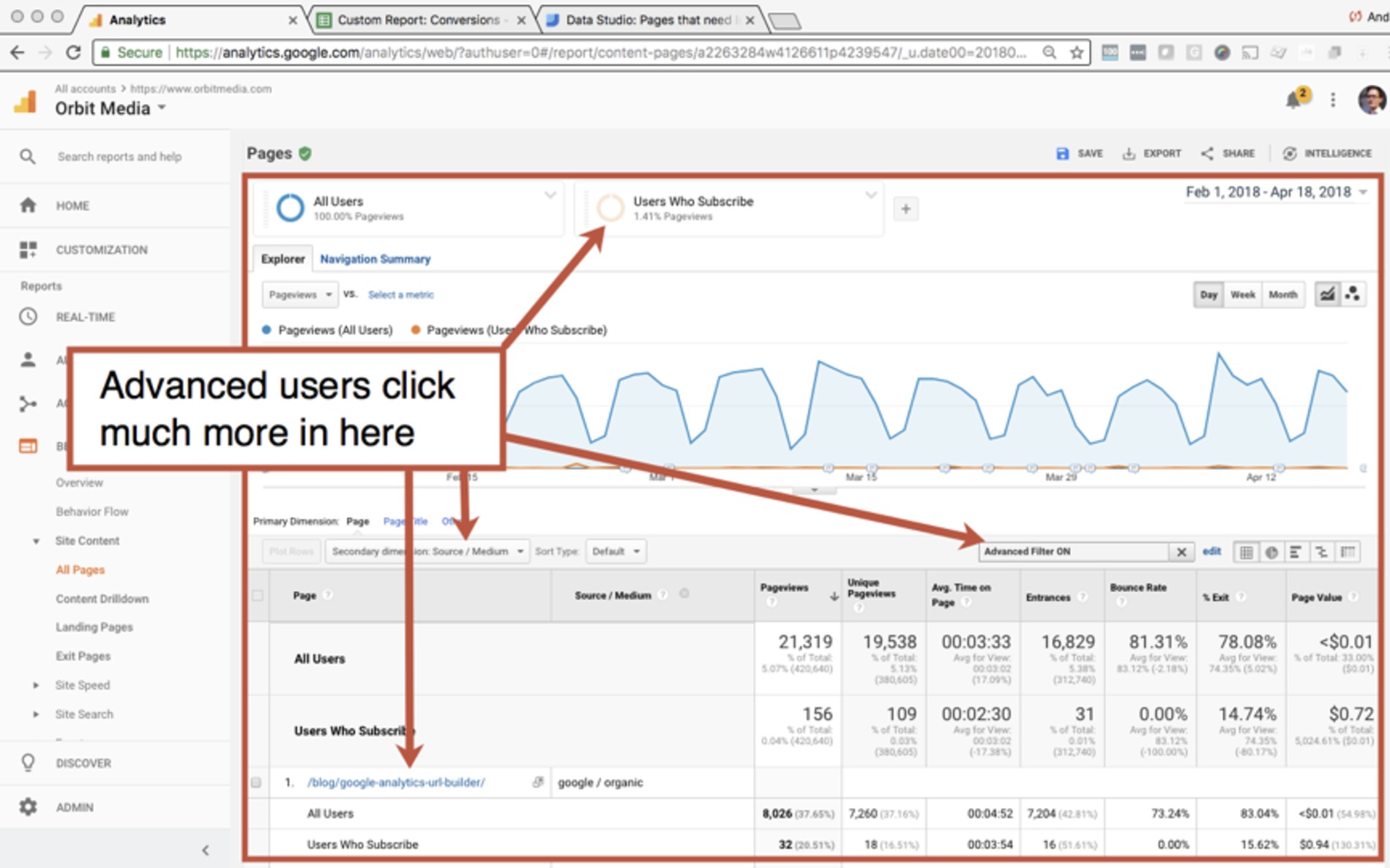
There’s a line that separates the beginners from the more advanced users of Analytics. It’s the line between the menu on the left and the reports on the right. Beginners click mostly on the left. Advanced users click mostly on the right.
I see you have some glowing reviews on your Orbit homepage. What’s the secret to getting good ones?
Start by listening. Any brand that does a decent job will have a few fans. The key is to capture these happy thoughts and move them onto the site.
If a client gives you a gushing thank you over the phone, sends a kind word of gratitude via email, gives you positive feedback during a meeting — each of these moments is an opportunity to win a testimonial. The trick is just to ask nicely at the right time. It sounds a bit like this:
“Thank you so much for the kind words! Feedback like this is so important to us. And it might help us connect with new clients. Would it be OK if I added this as a little blurb to our site? It would mean the world to us. And if that makes you feel even a little bit uncomfortable, no worries! It’s really not a big deal …”
Is there a good way to boost the odds of getting a response?
It’s all in the email. It should include five things, each of which makes a difference.
- Short subject line
- Direct tone that gets to the point
- Indication that there’s a small benefit to them: brand visibility and a link
- An easy way for them to graciously decline
- A “no work” option, where you write the draft for them
Feel free to steal this template:
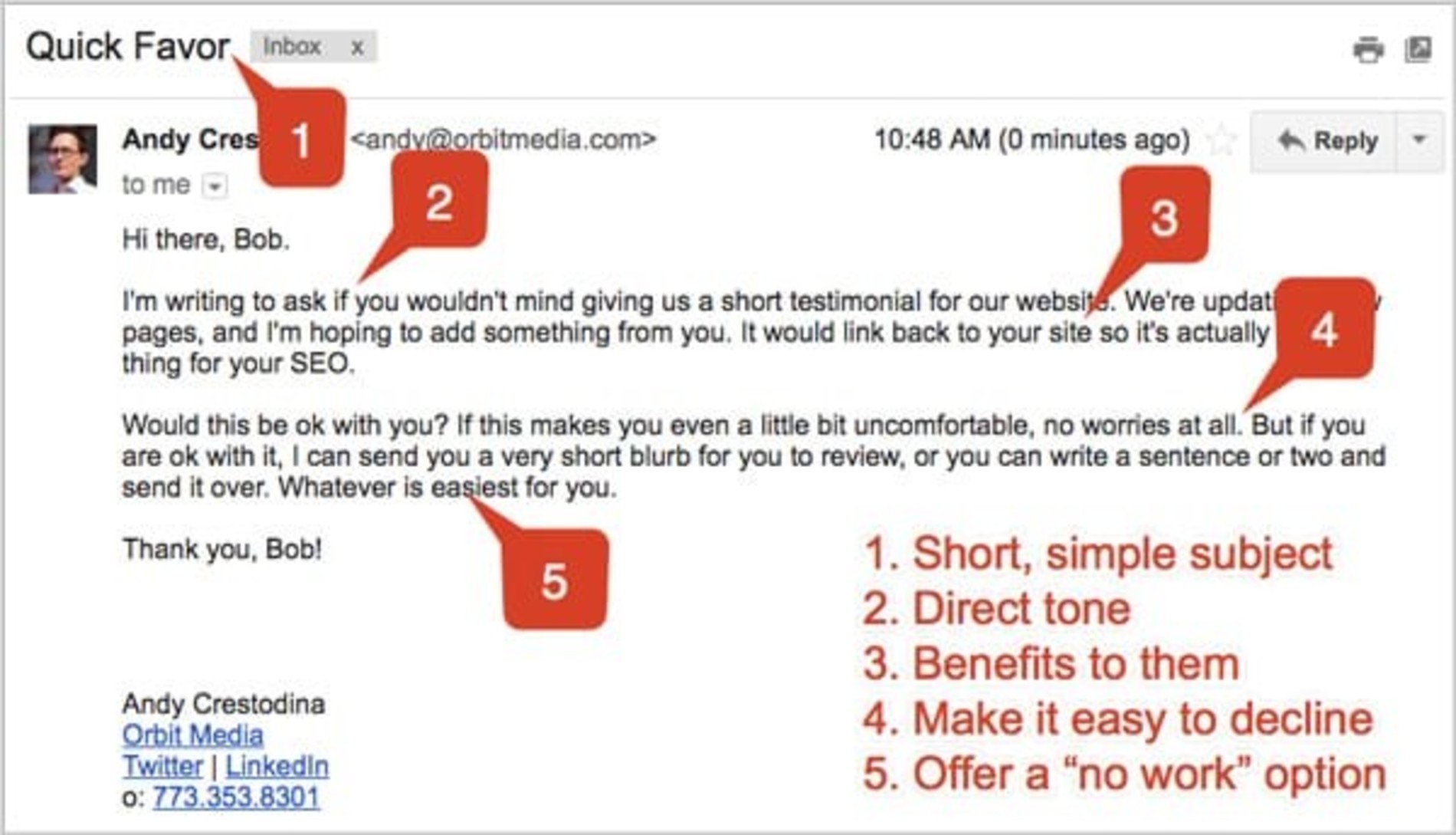
Source: How to write testimonials, Orbit Media
If they don’t respond, follow up once at most. Don’t push. If they’re not getting back to you, it’s probably because they feel uncomfortable and don’t know how to decline politely. Just move on.
The people and brands that take the few minutes to make these requests regularly will gradually build a huge pile of reviews and testimonials. And their websites will glow. The effort is low but the results are enormous.

